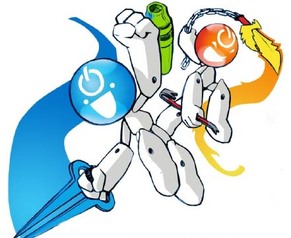
Further, I intend to analyze how GaymerX came to be -- particularly, its use of online technologies to gain popular support and funding through Kickstarter and, as a result of that massive success, the development of of a GaymerConnect app (which allows participants to find and connect to others with similar gaming/geek interests) as well as maintenance through Facebook, Twitter, and the GaymerX website. The use of Kickstarter essentially made corporate sponsorship of this event a non-necessity, allowing the event organizers more autonomy in creating a specific alternative convention (altcon).
Research Questions
Specifically, some of the questions I’d like to ask are as follows:
1) How does the GaymerX event serve as a space of both counterpublicity and counterpower?
2) Will the con be able to discuss and work to implement solutions to the above problems on an institutional level? (This to counteract typically neoliberal proffered solutions by both gaming companies and users, solutions that include anything from self-policing to simply ignoring the problem in the hopes that those who can’t stand the heat will get out of the kitchen.)
3) How will the con offer a safe space to all event-goers? And will the con really be inclusive of all gamers (queer gamers of color, women gamers regardless of sexual orientation, etc.)?
4) How have the event organizers utilized online social networks to build the event, and how does the use of these technologies serve what Castells calls "the autonomy of the social actor"? (7).
5) What is the relationship between the GaymerX event and the general consumer framework of conventions in general?
Methodology
Because I consider this a folkloric event and because it is so very visual, I would like to create a film about the con. As a documentary setup, I would include not only footage from the con (floor action, panels, contests and community get-togethers) but also interviews with attendees and event organizers. The fieldwork would be combined with theoretical grounding that comes from the fields of American Studies, digital technology studies, leisure studies (game theory), queer theory and folklore, at least. As a queer gamer, I have an emic perspective on this subject, and so my challenge (as always) is to strive for as much reflexivity as possible and to consider the experience from an etic perspective, as well.
Argument
My hypothesis is that the event organizers are really looking to transform the convention space – from a potentially unsafe space consisting of “booth babes,” overly judgmental cosplay, and panels that neglect or only pay lip service to LGBT issues in gaming to one that that celebrates the queer gamer/geek, strives for inclusivity for all, and really attempts to bring awareness to the very real social problems that accompany these sorts of leisure activities. The need for this kind of awareness is important particularly for a generation where “everybody games,” which is the GaymerX motto. It’s not literally true, of course, but video game culture has become more mainstream than ever and serves as a primary source of recreation for many young people. In this visual/online culture, the chances of being exposed to hate speech and misrepresentation of LGBT communities have multiplied greatly, so the idea of creating a safe space for “gaymers” (particularly young gaymers) is significant.
One argument I’d like to make pertains to the social value of altcons such as these to bring publicity to an area that some people tend to dismiss as “frivolous.” But it is precisely because gaming is perceived mainly as “play” that it becomes important as an area of study and transformative power, however. In folklore, “ludic recombination” is an integral part of any ritual, for through play people learn the social mores of their communities. If in gaming people learn that epithets against race, gender, sexuality, ability, etc. are acceptable, or they are exposed to stereotypical representations of LGBT people, racial minorities, indigenous peoples, and women, then these are carried into other parts of their lives. Further, the anonymity provided by the Internet allows for the perpetuation of biases and makes hateful speech easier to get away with and harder to police.
I am hoping that how this con uses its space will help find ways of fighting these issues beyond the individual, forcing gaming companies to change their policies with regard to hate speech as well as include representations of LGBT peoples and other less dominant groups that are less stereotypically racist and/or misogynistic. This con has the opportunity to demonstrate to gaming companies that tolerating hate speech and creating racist/sexist/ableist misrepresentations in their games and at other gaming conventions is unacceptable because it DOES impact how people operate outside of these leisure frameworks.
Authors/Texts
Thus far, Coombe’s discussion of counterpublicity and how it operates is useful in informing I would approach the con as having a specific political agenda. I am also interested in Castells discussion about networks of power and how they operate, and I would like to discover how the con is a practical application of those ideas. I’m hoping that perhaps others in the class will have recommendations for expanding my theoretical framework?
 RSS Feed
RSS Feed
